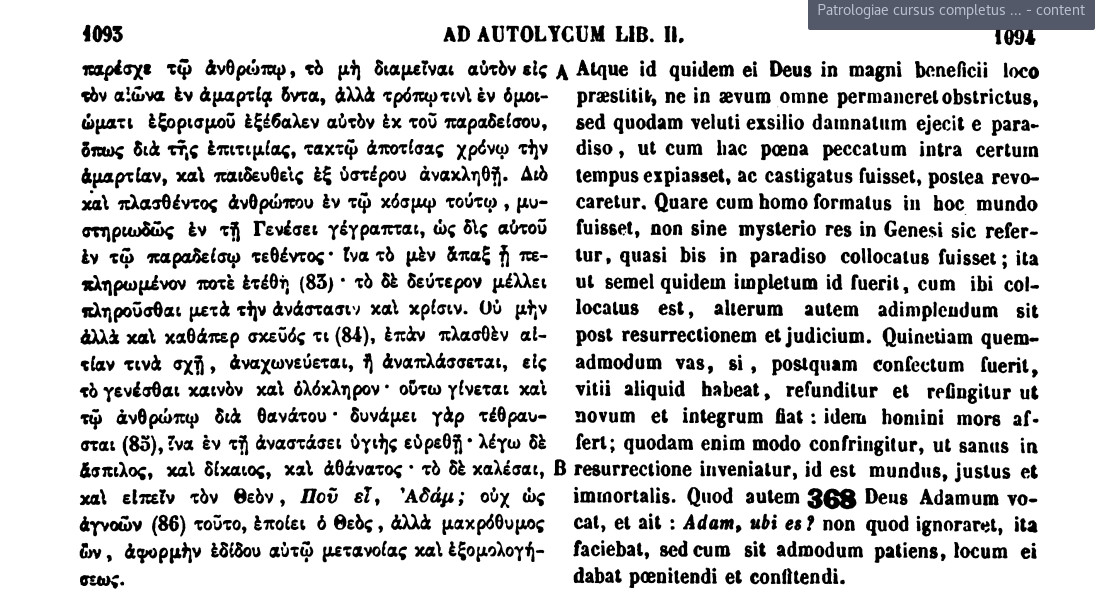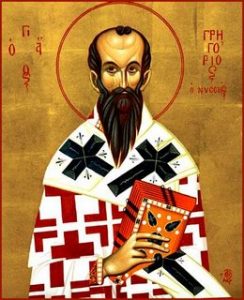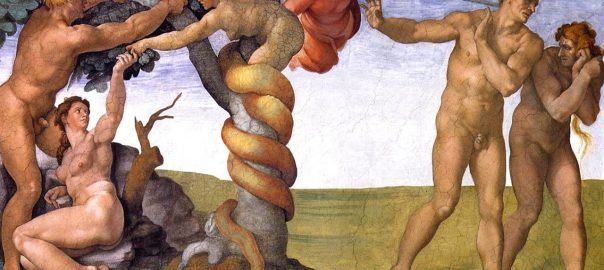
It’s a common idea in Patristic theology that death is not just a punishment but also in a way a gift, as it puts a limit to sin, and makes it possible for God to recreate fallen creature through the resurrection. Often there is also the idea that between death and the resurrection, there will be a time of purification and disciplining. Theophilus of Antioch (168 A.D.) explained:
”God showed great kindness to man in this, that He did not suffer him to remain in sin for ever; but, as it were, by a kind of banishment, cast him out of Paradise, in order that, having by punishment expiated, within an appointed time, the sin, and having been disciplined, he should afterwards be restored. Wherefore also, when man had been formed in this world, it is mystically written in Genesis, as if he had been twice placed in Paradise; so that the one was fulfilled when he was placed there, and the second will be fulfilled after the resurrection and judgment. For just as a vessel, when on being fashioned it has some flaw, is remoulded or remade, that it may become new and entire; so also it happens to man by death. For somehow or other [or: by force] he is broken up, that he may rise in the resurrection whole; I mean spotless, and righteous, and immortal.” (Theophilus of Antioch, ad Autolycum, ii, 26, thanks to Alex for this quote)
In a popular translation of this passage it is added that Adam was broken up ”by force”. As far as I can tell this must be the Greek ”δυνάμει” (meaning force, power or capability) which is here translated as ”somehow or other”. I like the emphasis of the alternative rendering, though, where death is said to be God’s way of breaking up humankind by force or power, as this makes it crystal clear, that this is not something that we can or even will do ourselves, but something that must be done against our will.

Irenaeus of Lyons (182 A.D.) said something quite similar to Theophilus, when he argued that God took life from Adam in order to put an end to evil:
”Wherefore also he drove him out of paradise and removed him far from the tree of life, not because He envied him the tree of life, as some dare assert, but because He pitied him and desired that he should not be immortal and the evil interminable and irremediable.” (Irenaeus, Contr. Haer. iii. c. 23, § 6)
In other words: Death is the punishment or ”the wages” of sin (Paul), but the resurrection is the revelation of God’s ’yes’ in his ’no’, as Karl Barth would later put it. Christ’s death and resurrection is the principle that transforms our death into life. This notion is clearly present in Gregory of Nyssa in the fourth century:
”Nevertheless one who regards only the dissolution of the body is greatly disturbed, and makes it a hardship that this life of ours should be dissolved by death; it is, he says, the extremity of evil that our being should be quenched by this condition of mortality. Let him, then, observe through this gloomy prospect the excess of the Divine benevolence.” (The Great Catechism §VIII)

Gregory then describes how human nature was ”enveloped” in the ”liability to death” in order to secure that we may part with evil and through the resurrection be reformed and created anew. Gregory later in his Catechism famously explains that the mystery of God’s plan was that, instead of preventing the dissolution of His body by death he decided to bring back life through the resurrection, so that Christ might become the ”meeting-ground” (or boundary, μεθόριον) of life and death, and thereby the originating principle (γενόμενος ἀρχὴ) for the resurrection (The Great Catechism §XVI, GNO III 16,79-86). In this way we are saved from evil by Christ through death and resurrection.
Like Theophilus in the above quote, Gregory clearly believed that there will be a process of purification after death before the resurrection (but possibly also after?). This idea, however, is not essential to the notion of death as not just a punishment but also a divine gift. I think it should be possible to ’demythologize’ the Patristic ideas of purification and disciplining, so that they are instead seen to be something this-worldly (as it so often is in both the Old and New Testament), pertaining to human history here and now. Even so, the main idea still holds true, that God’s judgment and mercy are not separate things. God’s mercy is always hidden in his judgment.
